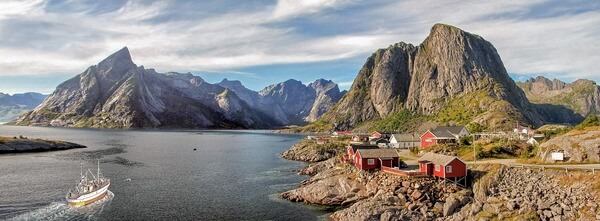News Release from windfair.net
Wind Industry Profile of
Climate protection: Politics alone won't fix it
As in previous years, the first three places in the climate protection index of Germanwatch and the NewClimate Institute remain vacant. This is followed - unsurprisingly - by the Scandinavian countries of Denmark, Sweden and Norway, which were always at the top in the past. "We are at the beginning of the decade in which it is primarily a matter of implementing the climate targets that have been set. Denmark, Sweden and Norway, like Great Britain and Morocco, are doing a lot better than the rest of the world," says Prof. Niklas Höhne from the NewClimate Institute and one of the authors of the index, praising some countries.
Based on various criteria, the index assesses the climate protection status of a total of 60 countries plus the EU as a whole, which together are responsible for about 90% of global greenhouse gas emissions, and ranks them accordingly. The categories are greenhouse gas emissions, renewable energy, energy consumption and climate policy.
In the climate policy category in particular, a lot happened in recent months, as a number of ambitious countries have resolutely embarked on the path to climate neutrality, including not only Scandinavia but also Morocco, the Netherlands, Portugal and France.
Germany is ranked 13th, the best it has been in eight years, but as it stands now it will "crashingly miss" its climate protection targets for 2030, according to co-author Jan Burck of Germanwatch. Much depends on the outcome of the country's coalition negotiations currently underway: "It's the crucible for the new federal government whether it sets the course for target achievement with an immediate program."

The Scandinavians have recognized the seriousness of the situation and are ahead in the race to zero greenhouse gas emissions (Image: Pixabay)
The role that a change at the top can play can be seen in the example of the U.S. For the world's second-largest CO2 emitter, the first year under new President Joe Biden is already having a positive impact. The U.S. climbs six places in the overall ranking to #55. "The improvement in the index so far is entirely due to the significantly better policy assessment and the new climate target for 2030. It will have to be seen in the coming years whether Biden's policies actually bear fruit in terms of renewables, energy efficiency and ultimately emissions," emphasizes Niklas Höhne of the NewClimate Institute. Climate protection already played a major role in Biden's election campaign, but he is facing strong opposition to his plans from Republicans in the country.
But politics alone won't fix it, BloombergNEF points out. "Achieving anything close to an average rise in global temperatures of 1.5 degrees Celsius this century will require not only policy, regulation and financing but also new technology breakthroughs. Decarbonizing our existing industries is not enough to limit the worst effects of climate change."
And the judiciary is also playing an increasingly important role: as governments and companies fail to present ambitious climate targets to meet the Paris Agreement's 1.5-degree goal, more and more citizens are turning to the courts to seek climate justice, according to a recent UN report. In fact, the number of cases has nearly doubled in the last three years. Current example: In Germany, Greenpeace is suing the Volkswagen Group.
"VW is a state-like major CO2 emitter with corresponding responsibility for climate protection," attorney Roda Verheyen says. "States emit very little CO2 themselves, commercial enterprises like VW emit a lot, and globally. Nevertheless, German and international corporations still think their path and commitment to climate protection are completely unclear and vague." The lawsuit is intended to force Volkswagen to quickly and consistently phase out the internal combustion engine. "This is the only way to realize a rapid shift to electromobility and to offerings that enable shared and climate-friendly mobility," explains Greenpeace.
- Author:
- Katrin Radtke
- Email:
- press@windfair.net
- Keywords:
- COP26, climate protection, justice, law, politics, index, USA, Germany, Scandinavia, Germanwatch, emissions, global, degree, Paris Agreement






